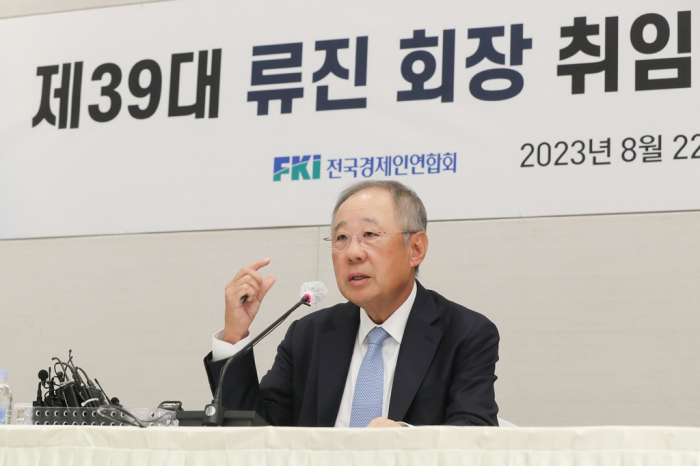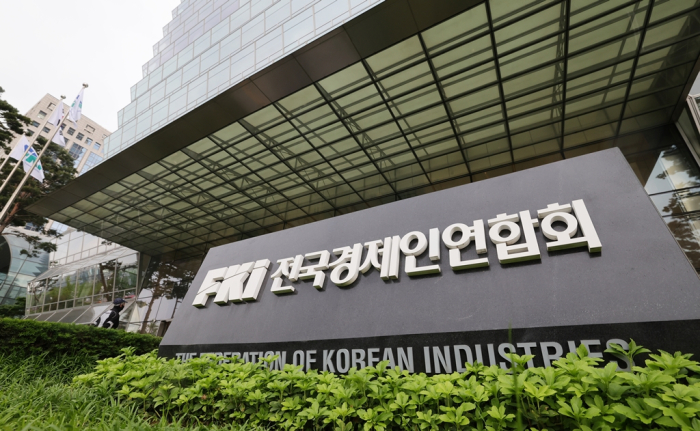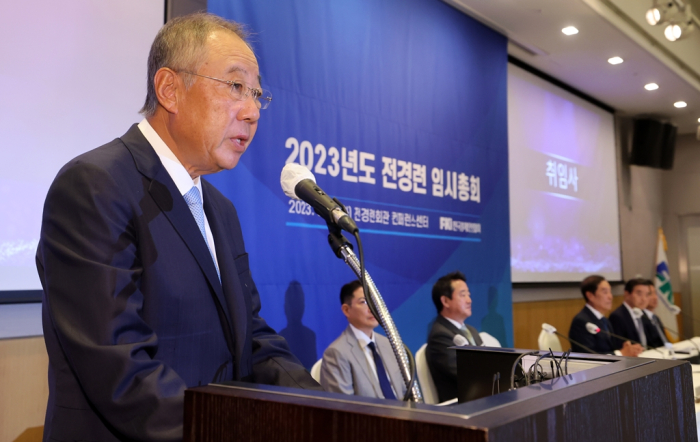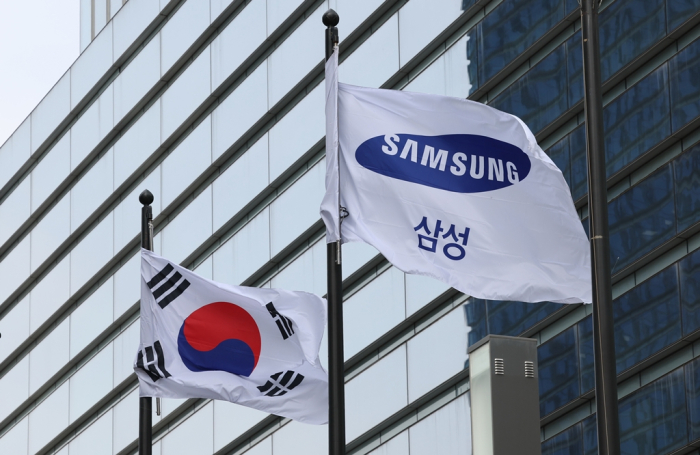Business & Politics
Korea’s business lobby group FKI goes down in history in disgrace
The new leader, under a new organization moniker, vows to turn it into a research center like the US' CSIS
By Aug 22, 2023 (Gmt+09:00)
4
Min read
Most Read
LG Chem to sell water filter business to Glenwood PE for $692 million


KT&G eyes overseas M&A after rejecting activist fund's offer


Kyobo Life poised to buy Japan’s SBI Group-owned savings bank


StockX in merger talks with Naver’s online reseller Kream


Meritz backs half of ex-manager’s $210 mn hedge fund



The Federation of Korean Industries (FKI), the voice of the conglomerates that formed the engine of the South Korean economy for more than five decades, is set to become a thing of the past.
A new entity poised to replace the nation’s top business lobby group said on Tuesday it will put its top priority on reform to regain the confidence of business leaders as well as the Korean people.
“We will clean up the dark past and cut all wrong ties,” said the new Chairman Jin Roy Ryu in his inaugural speech.
“We will aim for a Korea that is among the ranks of the G7 advanced nations. Our organization will take the lead in achieving that goal by becoming the first mover on the global stage.”
The FKI held an ad-hoc general meeting earlier in the day to appoint Ryu as its new chairman and approve various reform measures, including a name change.
The organization’s new moniker will be determined later but it will almost certainly return in some way to its inaugural brand of 1961, Hankyunghyup, or the Korea Businesspeople Association, in English.
As part of the rigorous restructuring, the business lobby group has also agreed to absorb its affiliated research firm, the Korea Economic Research Institute (KERI), to transform into a think tank while representing the interests of Korea’s leading businesses.

CASUALTY OF POLITICAL SCANDALS
Founded in 1961, led by Samsung founder Lee Byung-chull, the FKI has served as a leading and respected business lobby group representing Korea’s major conglomerates.
Under the rule of military strongmen-turned-presidents, however, the FKI has often become the casualty of political scandals as the organization’s leadership – chiefs of the nation’s conglomerates – has been the nexus for close ties between government and big businesses.
The FKI’s reputation has been tainted by a series of scandals, including the corruption scandal during the ousted President Park Geun-hye’s administration in 2016. Since then, many member companies, including Korea’s big four conglomerates – Samsung, SK, Hyundai Motor and LG – have left the group.
One of Ryu’s top priorities will be to bring these four back into the fold. Currently, about 400 Korean companies are members of the group.
The FKI said in February it aims to become a more open and future-oriented business group that can help Korea, Asia’s fourth largest economy, join the Group of Eight (G8) club.

REFORMIST WITH STRONG US NETWORKS
Jin Roy Ryu, whose Korean name is Ryu Jin, is chairman of Korea’s leading copper smelter and defense equipment maker Poongsan Corp.
The 65-year-old business leader, while keeping a low profile in Korea, is well known in the international community.
Having studied business administration at Dartmouth College in the US, Ryu is active among Washington, D.C.'s think tanks. He has served as a trustee for the Center for Strategic and International Studies (CSIS) since 2020.
Last year, he was globally recognized by winning the prestigious James A. Van Fleet Award granted by the Korea Society, a nonprofit organization promoting Korea-US relations.
Asked about the identity of the new business lobby group during Tuesday’s press conference, he said: “The CSIS is the model we’re going after. We want to be neutral, dealing with various issues and providing necessary information to our members.”
He said setting up an ethics committee is one of its primary tasks once the new lobby group is officially launched upon the trade ministry's approval next month.
“We’ll beef up transparency and self-regulation against malpractice among ourselves,” he said.

BIG FOUR CONGLOMERATES JOIN BUT WITH A CAVEAT
Major affiliates of Korea’s big four conglomerates said they would rejoin the top lobby group under a new flag, but at the same time warned that they would bolt immediately if the new entity is again involved in indecent business-political collusions.
Earlier this week, Samsung Group’s independent corporate compliance oversight committee recommended Samsung affiliates positively consider returning to the lobby group, although the panel expressed concerns over the feasibility of some reform measures proposed by the FKI.
Samsung Securities Co., however, said on Monday it won’t rejoin the business lobby group.
The decision by the brokerage unit of Korea’s top conglomerate reflects a lingering concern that the FKI won’t find it easy to keep a distance from political circles and could be influenced by undue pressure from policitians, industry watchers said.
Samsung Securities, which remains outside the compliance oversight panel, has chosen not to follow its recommendation, industry officials said.
Write to Jae-Fu Kim and Hyung-Kyu Kim at hu@hankyung.com
In-Soo Nam edited this article.
More to Read
-
 Business & PoliticsSamsung Securities decides not to rejoin Korea’s top business lobby
Business & PoliticsSamsung Securities decides not to rejoin Korea’s top business lobbyAug 22, 2023 (Gmt+09:00)
2 Min read -
 Business & PoliticsKorea’s Big Four conglomerates likely to regain FKI membership
Business & PoliticsKorea’s Big Four conglomerates likely to regain FKI membershipAug 09, 2023 (Gmt+09:00)
1 Min read -
 Business & PoliticsBullet maker Poongsan chief Ryu’s new role: Korea’s top business lobbyist
Business & PoliticsBullet maker Poongsan chief Ryu’s new role: Korea’s top business lobbyistAug 07, 2023 (Gmt+09:00)
3 Min read -
 Business & PoliticsFKI to be more open, future-minded and international as part of reform
Business & PoliticsFKI to be more open, future-minded and international as part of reformFeb 08, 2023 (Gmt+09:00)
2 Min read
Comment 0
LOG IN


